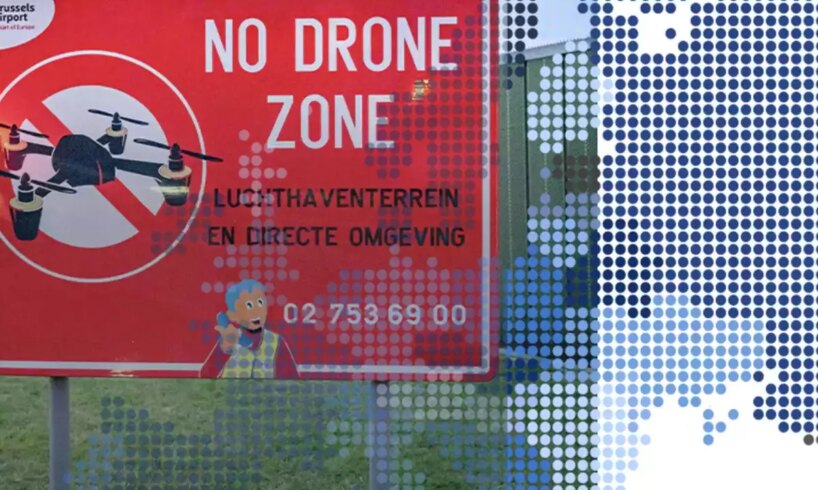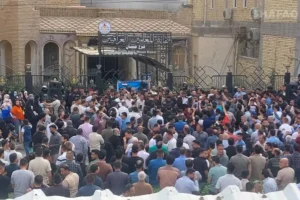
Paul Löbe House, which stretches along both banks of the River Spree in Berlin, is an iconic structure with a vast glass façade, ringed with windows, that houses the offices of many members of the Bundestag, Germany’s federal parliament. Above the nearby Reichstag building, where the full parliament sits, a transparent glass dome rises, offering a panoramic view over the German federal government’s center of power.
This impressive architecture, planted in the symbolic and geographic heart of Europe, is certainly inspiring. But it would take no more than a single Russian explosive drone for all the handsome glass panes of Germany’s parliamentary complex to shatter at once. “The problem is that we are sitting in a building that is not properly protected against a drone attack,” says Roderich Kiesewetter, a member of parliament from the Christian Democratic Union, speaking on the sixth floor of Paul Löbe House. “The idea behind the design of this building, which was constructed in the 1990s, was to embody the value of transparency in Germany’s political system. But this transparency also translates into extreme vulnerability and a lack of fear of danger. By the way, only some of the rooms here are protected against outside eavesdropping. In fact, if someone wanted to, they could be listening to us right now.”
If some spy did indeed listen in to our conversation, nothing he heard would have surprised him. Kiesewetter, a former German Army colonel who entered politics in 2009, is considered the most “security-minded” politician in Germany. Ever since Russia’s seizure of Crimea in 2014, he has used every possible platform to warn about the Russian threat and to urge the German leadership to adopt a more hawkish approach to the possibility of an armed clash with Moscow.
Kiesewetter’s alarmism has not won him many fans, and even inside his own governing party he is seen as an outsider, some would say a thorn in its side. Unlike in Israeli politics, where a security background almost automatically translates into votes at the ballot box, in Germany, a country still grappling with its past and whose current DNA is deeply hostile to war in all its forms, the security-focused discourse Kiesewetter promotes has led to his removal from prominent party roles. It has even made him the target of a violent assault by a citizen who knocked him down while calling him a “warmonger,” perhaps the harshest epithet one can direct at a German politician.
“The pillars of German society are politics, the economy and science,” Kiesewetter explains. “We have a political culture of distrust toward security professionals, combined with deep ignorance in this field. It is no coincidence that since German reunification, politicians with a military background have disappeared from the stage. When I came into politics, not everyone was happy about it.”
Kiesewetter is not particularly liked in the Kremlin either. He says that he appears on a Russian secret list of figures considered a threat to its security. “We have to tell the public the truth,” he says. “If we do not take steps against Russian aggression in Europe, Russia will keep pushing our boundaries. We are acting like blind people.”
Friedrich Merz, Germany’s chancellor. Photo: Getty Images
Prisoners of conception
Kiesewetter’s story, and the fragility of Germany’s parliamentary complex, illustrate the state of Europe as a whole. Since Russia invaded Ukraine in February 2022, the continent has found itself caught between a hammer and an anvil. On the one hand, European states are doing their utmost to preserve stability, refraining from fully throwing their weight behind Ukraine and doing everything they can to avoid a direct confrontation with Russia. On the other hand, these same countries are looking anxiously eastward and seeing Russia arming itself to the teeth, and its president, Vladimir Putin, growing bolder and issuing ever more far-reaching statements. All this is happening while Europe still depends economically on Russian energy, and while the US is seeking to reduce the vast budgets it has been channeling to NATO, the military alliance meant to protect Europe against a third world war. “It is as if we are fighting Putin with one hand tied behind our back,” complains Kiesewetter.
European anxiety about war diminishes the further west and south one moves across the continent. Poland and the Baltic states, which border or are close to Russia, are already making preparations on the ground for the possibility of an all-out war. In France, Britain and Spain, by contrast, preparations for such a clash are proceeding at a snail’s pace, if at all. In this sense Germany, the economic giant located in the middle of Europe yet still at a safe distance from the Russian border, and the country meant to serve as NATO’s main logistical base in any campaign to block Russia, acts as litmus paper for the European policy as a whole. “Germany is in the middle, and it is the one that needs to take responsibility and set the course,” says Kiesewetter.
The German government has already begun taking a series of steps, some of them drastic by its standards, to prepare for a potential confrontation with Russia. Yet Kiesewetter remains uneasy. He says the German leadership is still trapped in what Israelis might call “an October 6 mindset”: ignoring clear warning signs, turning its back on violations of sovereignty and assuming that if and when war breaks out, there will be advance notice. “It may be that Germany first needs to experience an intelligence failure like October 7 or September 11 in order to wake up and change its approach,” Kiesewetter says. “I just hope that when such a failure occurs, if it does, it will not lead to a catastrophe on a massive scale.”
Indeed, during a visit to Berlin last week it was impossible to ignore the quiet. Even the city’s most central streets felt hushed. It is not a tense silence born of alertness, of ears pricked for sirens or explosions, but the calm of German politeness, which seems to rub off on the tourists as well. Even the official German figures we spoke to, who are well briefed on the intelligence picture, struggled to imagine that this quiet might suddenly be shattered. “Do you really believe that a Russian drone will suddenly land in the middle of Berlin?” one of them asked me in astonishment, scrutinizing my face. “This mindset of constantly fearing your neighbors is an Israeli mindset. In Europe things are different.”
And yet, Germany in the autumn of 2025 is a country in the throes of a Zeitenwende, the “turning of the times,” the term coined by former chancellor Olaf Scholz in a landmark speech he delivered in parliament days after Russia invaded Ukraine. This week the current German defense minister, Boris Pistorius, declared that “this is Europe’s last peaceful summer.” As one Israeli official who knows the intricacies of German politics puts it, “Germany is in the middle of a U-turn by an aircraft carrier. This is a state that is cutting itself off from economic dependence on Russia, arming itself and working on a law to reinstate compulsory military service, which is a radical change for it. And yet Kiesewetter is right. If war with Russia breaks out tomorrow, Germany currently has nothing to put on the table.”
Grasping at air
In many ways, the war between Russia and Europe has already begun, and it is not confined to the borders of Ukraine. The buzzword on this front, almost a mantra in the mouths of politicians, officials and experts in Germany, Israel and other European countries, is “hybrid warfare.”
The term refers to a long, ongoing string of sabotage incidents, influence operations, cyberattacks and other violent acts that Russia is carrying out against European states. It covers, for example, the mysterious severing of undersea communications cables in the Baltic Sea; an unusual explosion at the cargo terminal of Leipzig Airport in Germany; and media investigations that uncovered evidence of Russian use of agents recruited via social media to sow chaos and public panic in European countries.
A recent report by the British think tank International Institute for Strategic Studies (IISS) found that since 2022, 66 “hybrid warfare” operations attributed to Russia have been carried out across Europe, including assassinations, attacks on infrastructure and even acts of terrorism. Thirty three of those operations took place in 2024 alone. In most cases, European governments preferred to absorb the blows, to make use of the carefully constructed Russian “deniability space,” and to settle for tepid condemnations.
In recent months, however, the hybrid war with Russia has shifted up a gear. Russian fighter jets violated Estonian airspace, even swooping toward a German warship sailing in the Baltic Sea. In September, some 20 Russian drones crossed into Polish territory, also a NATO member state. “This is an attempt by the Kremlin to test NATO’s responses via gradual escalations,” Poland’s foreign minister said afterward. Friedrich Merz, Germany’s current chancellor, also broke with his habitual caution when he stated that “we are not at war, but we are not in a state of peace either.” Since then, Russian drones have entered the territory of another NATO member, Romania, without prompting any military response.
In the weeks that followed, several incidents were recorded in which unmanned aerial vehicles were seen hovering above towns and cities in Germany, Denmark, Norway, Sweden, Belgium and Lithuania, among others, sometimes near airports and sensitive military facilities. German officials said these were “military drones for intelligence-gathering purposes,” but did not explicitly link them to Moscow. In early October, airspace over Munich was closed, forcing dozens of flights to be canceled, after mysterious drones were spotted above the city during the Oktoberfest celebrations. In the aftermath, European interior ministers discussed creating a “drone wall” that would block aerial incursions from the direction of Russia, as well as legislative changes that would make it easier for armed forces to shoot down unmanned aircraft.
Russian President Vladimir Putin and the Russian warplanes that entered Estonian airspace. Photo: AP, AFP AP, AFP
Ukraine first
These hesitant countermeasures stand in sharp contrast to Russia’s rapid advances when it comes to drones. Over the past two years, Russia has raised its defense budget to levels unseen since the Cold War, and a large share of that money has gone to producing unmanned aircraft, the main weapon it is using in Ukraine. According to some estimates, by early 2026 Russia will be able to produce roughly 10,000 explosive drones a month, which would make it a global power in this sphere. Israelis will bring to mind the “Iranian night of missiles,” when some 300 missiles and drones were launched at Israel. Now multiply that several times over.
Behind Russia’s drone industry lies a story whose irony almost defies gravity, in every sense. In 2011, Iran used electronic warfare to take control of a CIA drone operating over Afghanistan and bring it down on its territory. Based on this “captured” American UAV, Iranian engineers developed the Shahed series of attack drones, whose most widely used model is the Shahed 136. As fate would have it, the engines installed in the early generation of these Iranian drones were made in Germany. “We know this, because engines manufactured by a German company were found in some of the drones that fell in Israel,” says an Israeli official.
After the war in Ukraine broke out, cooperation between Russia and Iran tightened. Russia purchased thousands of Shahed drones from the Islamic Republic, and used them in Ukraine. The war turned out to be a highly useful testing ground from Russia’s point of view. A study by the Foreign Policy Research Institute (FPRI) in the US described how, in the battle of minds that developed in the skies over Ukraine, the Russians began devising methods that refined their drone warfare capabilities, perhaps as preparation for future wars against additional countries.
In recent months, Russia has begun producing Shahed drones itself, according to one account with extensive help from China, while simultaneously improving their strike capabilities and flight ranges. The main drone production facility is in Yelabuga, about 1,000 kilometers east of Moscow, which the Ukrainians have tried and failed to hit several times.
“The Russians started out by producing the same model as the Iranian drone and gradually improved it,” says Eitan Ahlau, an expert in anti-drone defense. “This is an aircraft that flies low, at a speed of 80 to 100 knots, and carries warheads containing 10 to 50 kilograms (22 to 110 pounds) of explosives. Because many of its parts are made of fiberglass, it is hard to detect. The Russians have recently been changing the engine in order to mask the hot exhaust, which will make it harder to spot the drones with thermal sensors. They are also altering its antenna array to complicate the communications and navigation jamming the Ukrainians use, and increasing its flight speed. Today the Russians are manufacturing these drones at a murderous pace.”
As part of Russia’s method of warfare in Ukraine, it launches swarms of hundreds of explosive drones at once, with dummy drones mixed into the swarm. These carry no explosives and have cardboard bodies. The aim is to confuse the enemy’s air defenses, and to do so at relatively low cost. “The attack drones cost around 30,000 to 40,000 dollars each, and the dummy drones cost a few thousand,” Ahlau estimates, “while the interceptor missiles cost millions. This is essentially an economic battle. Once the Russians accumulate a sufficiently large number of drones, they will be able to go to war against NATO, because there is no force in the world that can intercept such quantities. Imagine that Russia decides to invade one of the Baltic states and then suddenly, just as a warning shot, it launches 5,000 drones and a handful of them hit government buildings or financial institutions in a European capital. That would make it crystal clear to Europe that it has no real way of dealing with this.”
A building destroyed by a Russian strike, Donetsk region, Ukraine, October 2025. Photo: AP
Firing in all directions
The developments on the eastern front have not entirely escaped the attention of European states, especially Germany. In fact, the government of Chancellor Merz, who took office in May 2025, has begun implementing what looks like a far-reaching reform to strengthen Germany’s military.
Already during coalition talks, the parties agreed that the additional spending on the German defense budget would not be counted as part of the national deficit. That decision enabled the government to allocate a staggering 377 billion euros for military procurement, with the goal of turning Germany’s armed forces into “the strongest conventional army in Europe,” in Merz’s words. German officials confirm that the government recognizes that “Russia is planning something, and our armed forces are not ready,” as one of them puts it.
Israel has naturally been drawn into this swirl of spending. Beyond the huge deal to purchase the Arrow 3 missile defense system from Israel Aerospace Industries, Germany has bought Spike anti-tank missiles from Israel and, according to media reports, drones as well. Beneath the surface, however, a long list of negotiations is underway between the German government and Israeli defense companies and security startups to acquire additional systems on a very large scale. “This is a window of opportunity for Israel to provide technology to Germany,” says an Israeli source familiar with the issue, “because in a few years, Germany’s own defense industry will catch up with Israel, and right now Berlin wants off-the-shelf solutions.”
According to air defense expert Ahlau, who is a member of one such defense startup, Israel must make things easier for startups working in this field, both by providing financial incentives and by easing restrictions imposed by the Defense Ministry’s Defense Export Controls Agency. “Unlike the civilian high-tech sector, Israeli defense exports are shackled by regulation,” he explains. “If nobody wakes up, Israeli companies will move abroad or quit the field altogether. We could miss a golden opportunity for the economy.”
Israeli and German officials involved in these negotiations refuse to divulge details. “But Israel has advanced weapons systems, and you can imagine that Germany wants many of them,” says one. An Israeli source who recently met with senior figures in the German defense establishment came away with the impression that, in terms of procurement, they are “firing in all directions.” “In Germany they are watching Russia’s rearmament with concern and are already examining the buildup of Russian forces near the borders with the Baltic states,” he says. “The problem is that Germany still faces huge gaps, mainly in training and manpower.”
Which brings us to one of Europe’s biggest security challenges: soldiers, or more precisely, the lack of them. The German parliament is currently debating legislative amendments that would allow the state to reinstate compulsory military service, out of the recognition that buying equipment alone is not enough, and that soldiers are needed to operate it. Beyond the political hurdles facing such legislation, there are social factors that make it difficult for the German Army to increase its ranks. As one interviewee put it, “The Ukrainians enlisted en masse, but they did so because they had no choice after the Russian invasion. Do you really think young Europeans will give up their comfortable lives and rush off to die fighting Russians?”
A generation passes
This concern is well founded. A poll published in August 2025 found that 59 percent of Germans would not be willing to take up arms and fight, and in Italy the figure is even lower: only 16 percent of citizens would be ready to fight for their country.
On this point, Prof. Susanne Fischer, a lecturer in the intelligence studies department at the Federal University for Public Policy in Berlin, says: “There is now a public debate about the need to bring back compulsory service, which would require young people to enlist in the army after high school. This debate has intensified as the possibility of war with Russia has become more concrete.”
Fischer teaches and lives in Berlin, but we met at the Hebrew University in Jerusalem, where she was attending an annual intelligence studies conference. Talking to her, one gets the impression that even if the German government has begun taking steps toward a possible clash with Russia, the German public is still largely lagging far behind. “As a Berlin resident and as a mother, of course I am worried about the possibility of war with Russia,” she says. “My 11-year-old son also asks me, ‘Mom, what will happen if Russian missiles explode in Berlin?’ But these feelings are not widespread among most of the public.
“I am an academic who works on security issues, so I think about this more. Politicians and experts have also started talking more about the possibility of war with Russia. There have been public debates recently focused on this and on Germany’s security challenges. But ‘ordinary’ citizens, whoever they may be, are still unaware of the security challenges facing Germany. I think it is important that more and more people in Germany and across Europe begin to talk about the dangers coming from Russia, in order to raise public awareness.”
Even in Germany, where the public debate on security is at least beginning to stir, it remains dormant further west, in Britain. “Recent polls show that only a small proportion of young people in Western European countries would be willing to take part in a war,” says Dr. Huw Dylan, deputy head of the intelligence studies department at King’s College London, who also attended the intelligence conference. “But since the sword of war is not actually hanging over our heads, those figures are not necessarily significant. There is no doubt that in a country like Britain, which enjoys the privilege of being far from the border with Russia, the tension is not felt, in contrast to places like Estonia or Poland. In any event, it is clear that a hybrid war is already underway in Europe, and there are people who fear that this war will escalate. But I do not fear a full-scale war in the foreseeable future.”
Russian President Vladimir Putin (Reuters/File) | File photo: Reuters
Zero hour
In my conversations with European officials, I tried to understand whether they had learned anything from Israel’s experience on October 7, when the Hamas terrorist organization surprised Israel with its murderous assault. Yet even the “security hawk” Kiesewetter cannot imagine an absolute surprise on that scale. “The war will not begin with Russian tanks charging into Berlin, nor with airstrikes on Germany,” he says emphatically. “If anything, the war will start with a move by Putin against the Baltic states.”
Prof. Fischer, an intelligence expert, also does not sound like someone about to shatter the prevailing conception. Like the other German interviewees, she identifies 2029 as the year in which war with Russia is most likely to break out, if it does. Israeli officials who recently met senior NATO figures say those officials also pointed to 2029 as the target year for the alliance’s war readiness.
“Europe can certainly learn from the Israeli experience,” Fischer says in this regard. “Intelligence experts in Europe are already saying that if there is an assessment that war will break out in 2029, that does not mean it cannot erupt tomorrow. The pretext that will supposedly justify a Russian attack could appear at any moment, before we are prepared.
“At the same time, the liberal democratic states of Europe benefit from peace and stability, and no European leader has any interest in attacking Russia. What I can imagine is a scenario in which Putin tests Europe’s willingness to set limits for him, for example in places such as the Baltic states.”
Many of the European experts we spoke with argued that Putin has led Russia into economic dependence on its war industry. “I fear that if he ends the war in Ukraine, he will have no choice but to ‘look for’ another war in order to preserve his status and Russia’s war economy,” Fischer says. “I hope that if that happens, NATO will pass the test and force Putin to back down.”





